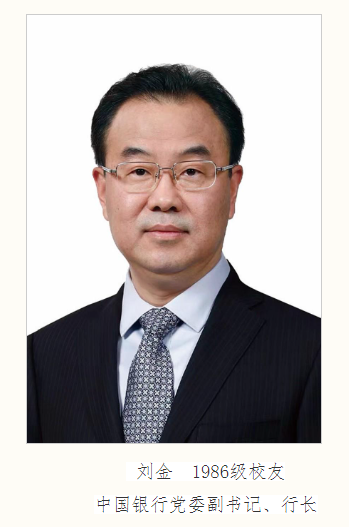
速览君
“散文《外文楼的丁香》尽显中行原行长刘金的文学功底。”
也是在8月底9月初的开学季,1986年在美丽的泉城济南的洪家楼,一位19岁的新生到山东大学外语系报到,开启了他在这所著名学府的求学生涯。
他在这里读了四年本科,紧接着又读了三年的硕士,专业是英语语言文学。
不过,这位青年才俊没能成为翻译大家,却成为中国金融行业的翘楚。
他就是日后成为中国银行行长的刘金。
他还曾担任中国光大银行行长,以及国家开发银行副行长。这样的履历,放眼中国金融界,屈指可数。
刘金也因此成为山东大学外国语学院知名校友,成为一批又一批学弟学妹们顶礼膜拜的对象。
不过,刘金的行长职业生涯,在2024年8月25日戛然而止。他因“个人原因”,辞任这家资产规模近34万亿的四大国有银行行长职位。
辞职后的刘金,依然留在山东大学外国语学院的知名校友榜上。不像有些院校,一有风吹草动,就着急下榜删文。

从这一点来看,山东大学外国语学院那片古色古香的建筑,以及高耸入云的参天古树,依然会成为刘金心目中最美丽的景色。
毕竟,刘金人生最美好的7年,都留在了那里,比他担任三家银行行长(中国银行行长+光大银行行长+国家开发银行副行长)的总和还要长。
也许正是因为这样的原因,2020年9月,山东大学外国语学院90周年院庆之际,刘金满怀深情地写下了一篇散文——《外文楼的丁香》。

这篇散文,以及相应的英文,颇显刘金的文字功底。山东大学科班出身的高材生,出手果然不凡。
在文中,刘金引经据典,诗词信手拈来,如,南唐李璟的“丁香空结雨中愁”、唐代李商隐的“芭蕉不展丁香结,同向春风各自愁”、当代戴望舒的“丁香一样的结着愁怨的姑娘”……
如没有深厚的文学功底,显然写不出这样传神而感人的文章。
由此或许可以看出,刘金之所以能够在精英云集的中国金融行业脱颖而出,确实有其自身才华的原因。
刘金在山东大学所接受的专业教育,是当时国内高校的顶尖水平之一。据山东大学外国语学院官网介绍,英语专业创建于二十世纪三十年代。著名学者梁实秋先生和戏剧家洪深先生曾任教于此,为其创造了高水准的起点,为后人铸就了优秀的治学传统。
笔者注意到,刘金1990年至1993年所就读的山东大学英语硕士专业,也是我国首批硕士学位授权点之一,1996年评为省级重点学科,2001年被确定为省级强化建设重点学科,2000年获得博士学位授予权,2002年被评为山东大学名牌专业。
那时的山东大学,在高校中的口碑和知名度似乎比现在要高,而且也没有出现后来引发舆情的“学伴”之类的“塌房”事件,依然是万千学子心目中最圣洁的殿堂。刘金就是在这样的环境里完成了他的本科和研究生教育。
1993年刘金硕士毕业后,进入中国工商银行工作,从此开启了他的金融职业生涯。
顺便提一句,刘金在中国银行行长职位上的“前辈”,也有一位学英语专业的行长,他就是当时金融界赫赫有名的王雪冰。
王雪冰是1972年进入北京外贸学院(现对外经济贸易大学)英语系学习。由此看来,王雪冰是恢复高考前的学员,与刘金经历过千军万马过独木桥进入山东大学接受正规科班教育相比,还有明显不同。
巧合的是,刘金硕士毕业后成为金融行业“新人”的1993年,王雪冰已经站到了“金字塔”的顶端,开始担任中行行长,时年仅41岁。
不过,王雪冰于2002年在建行行长任上落马,后因受贿罪被判处有期徒刑12年,现在应该是早已恢复人身自由。
两位都曾担任过中国银行行长的英语专业毕业生,应该是“相逢何必曾相识”。
笔者注意到,王雪冰落马时年仅50岁,而刘金辞任中国银行行长,已经57岁,担任行长3年有余。
刘金起步工商银行,曾先后担任工行山东省分行副行长,工银欧洲副董事长、执行董事、总经理兼工行法兰克福分行总经理,工行总行投资银行部总经理、江苏省分行行长等职务。
2018年,刘金的仕途进入了“快车道”。当年9月,他跨行担任国家开发银行副行长;仅仅1年多之后,他又进入中国光大银行担任行长;又过了1年多,他于2021年初,开始担任中国银行行长。
刘金是在2020年1月至2021年3月期间担任中国光大银行的行长,这也是他首次成为全国性大银行的“正职”行长。
春风得意马蹄疾,一日看尽长安花。
2020年9月山东大学外国语学院90周年院庆,仕途如日中天的刘金,写下了那篇颇具深情又意气风发的散文《外文楼的丁香》。
这篇仍保留在山大外国语学院官网上的文章,中文版并没有介绍刘金的职位,但在英文版文末,则有这样一句:“Mr. Liu Jin is Executive Director, President of China Everbright Bank (CEB)”。
这样低调而优雅地向校友们介绍身份,也可谓别出心裁。
在文中,刘金表示,“愿来日再回外文楼,还能看到那些丁香,合适的季节还能闻到丁香的味儿。”
辞任行长之后的刘金,应该还会有机会回到母校,看一看他朝思暮想的丁香花。
想必他的辞任,也一定会在校友群中引发热议和猜测。
但刘金辞任行长后的中国银行,仿佛什么事情都没有发生过。
8月30日,也就是刘金辞任行长5天之后,中国银行召开2024年中期业绩发布会,董事长、同时也是代理行长职责的葛海蛟,率领一众高管出席。
净息差、房地产贷款、数字化转型等话题都是这次发布会的热点,唯独没有刘金行长的辞任,仿佛他的辞任公告没有人看过一样。
这或许是中国银行最为值得称道的进步之一:银行的运行不再依赖于个人,而是整个运行有序的机制。
这样的机制,并不是每家公司都有这样的水平。君不见,诸多大型民营企业,随着创始人或者灵魂人物的离去,总会发生或大或小的震荡,甚至很快走向分崩离析。
从这一点来看,应该为中国银行点赞,既为刘金担任行长期间的中国银行点赞,也为刘金辞任行长之后的中国银行点赞。
外文楼的丁香
——刘金
外文楼是山大老校区最令人留恋的一座建筑了。红门,灰砖墙,四尖角,歇山顶。门前的绿化带、小路、高大的梧桐树、花园,还有那片如神来之笔的小竹林,给古色古香的外文楼增添了无尽的生气。
最让我难忘的楼前墙根下那排一簇一簇的丁香树,不知什么年代种植的,但能看出树龄已经很长。每簇丁香中,总有一两株长得很高的,已经高到二层楼我房间的窗台,贴着窗框、窗扇和玻璃,好像在朝房间里面偷窥,又好像在吸引窗内的我的注意。雨过天晴,丁香树的叶子被洗得一尘不染、鲜绿如碧,让人自然想到李清照“绿肥红瘦”的绿。因为是细雨,丁香花并没有遭到破坏,仍然挺着她的花蕾,和碧绿而肥硕的叶子一起,昂首展现着一派勃勃的生机。丁香花隔了一层玻璃就在眼前,能看得十分真切,花蕾半开半闭,饱满有力,满带着春天的灵动和气息。我纳闷这样的花怎么总被和惆怅、哀怨联系起来,南唐李璟说“丁香空结雨中愁”、唐代李商隐用“芭蕉不展丁香结,同向春风各自愁”,当代的戴望舒也说“丁香一样的结着愁怨的姑娘”。
丁香这么鲜艳,外面的空气想必也是沁人心脾的吧? 我就伸手去开窗,那还是老式的木窗,红色的油漆已经斑驳,下方用铁的插销固定。我用力向上拔起插销,窗就开了。顿时出现了让我惊喜的,也是让我至今念念不忘的一幕: 贴在窗玻璃上的那枝丁香,连花带叶,因为嫩枝的弹力,扑棱一声闯进了我的窗内,在灿烂的阳光下,摇摇晃晃向我舞动着身姿,似乎在炫耀她闯入的胜利;枝上的雨水飞溅到我的脸上、身上、窗台上,外面带着花香和新雨味儿的空气也 旋即进来,弥漫了整个房间。
多年以后我到德国,落户一个美丽的小市镇巴德洪堡。市长骄傲地告诉我,小镇的广告语是“香槟样的空气”。我微笑不语: 我在母校,在外文楼,早就沐浴过“丁香一样的芬芳”了。
如今,小竹林和梧桐树都没有了,愿来日再回外文楼,还能看到那些丁香,合适的季节还能闻到丁香的味儿。
Scent of lilacs recalls memories of university days
A lilac tree in front of Building No 7 at Shandong University still blooms on campus.
Building No 7, which is home to the Department of Foreign Languages and Literature, is the most fascinating building on the old campus of Shandong University. Featuring red doors, grey walls, a gable-and-hip roof and bearing a classic style and an antique flavor, the building has borrowed vitality from the greenbelt along the sunny side windows, the walking path, the tall empress trees, the cypress garden and the nearby bamboo grove that I always thought grew from the touch of a deity.
The most memorable thing to me is the clusters of lilac trees against the wall. It is unknown when the lilacs were planted there, but they seem to have kept well with the age of the building. One or two lilac trees in each cluster grew exceptionally high, stretching up to the windowsill of my second-floor room. Their top twigs used to move and touch the frames, casements and panes of the window, as if they were peeking into the room and attempting to attract my attention.
Each time when a light rain ended, the lilac leaves were washed spotlessly clean, vivid and verdant, reminding me of the description of "flourishing plump leaves and withering lean flowers" by the ancient Chinese poet Li Qingzhao. The lilac flowers had been bathing yet not destroyed by the rain and held up stamens and demonstrated their thriving liveliness amid the "fat" verdant leaves. The lilac flowers were seen crystal clear as they were just behind the pane glass. Some were open, some were semi-open and others were still closed in buds. But all of them were plump and strong, carrying the vigorous atmosphere of spring.
I often wondered why such lovely flowers had always been used to describe and express people's melancholy and plaintive moods as in the lines of Li Jing of South Tang Dynasty: "The lilac flowers tie knots of bud in vain to show its melancholy in the rain ", or as in the lines of Li Shangyin of the Tang Dynasty (618-907): "The banana leaves stay coiled and the lilac flowers remain knotted in buds. While they are stroked by the same spring breeze, they have their own concerns". There also are the lines of the contemporary poet Dai Wangshu: "a lassie with entangling melancholy like lilac flowers with knotted buds " .
As vibrant as the lilac flowers seemed, the air outside must be refreshing. I reached out my hand to open the window. It was an old-fashioned casement window, with an iron bolt below to lock it. The scarlet paint over the window had been chipped off here and there. I pulled up the bolt hard and the window opened. What amazed me, which has been vividly lingering in my mind for so many years, was that a lilac twig with leaves and flowers flapped into the window with its elastic force as soon as it lost the hold of the glass, like a student running into the wrong classroom. The rainwater on the twig splashed on my face, my front, and the windowsill. My room was soon pervaded by fresh air with the delicate scents of lilacs and rain.
Many years later, I went to Germany and settled down in a beautiful city named Bad Homburg. The mayor told me with particular pride, "The slogan of this city is Champagne-Luft (Champagne-scented air)". I quietly smiled and thought to myself: I was soaked long ago in the floral scent in Building 7 of my alma mater.
Today, in front of the building, the bamboo grove and the empress trees have been removed. The lilac trees are fortunately still there and have the chance to treat us with their fragrance in the right season, a fragrance I wish to savor again someday.
Mr. Liu Jin is Executive Director, President of China Everbright Bank (CEB).